Guns won’t stop goals from girl footballers in India’s violence-hit Manipur
The team keeps up its training amid the ethnic violence that has rocked the northeastern Indian state.
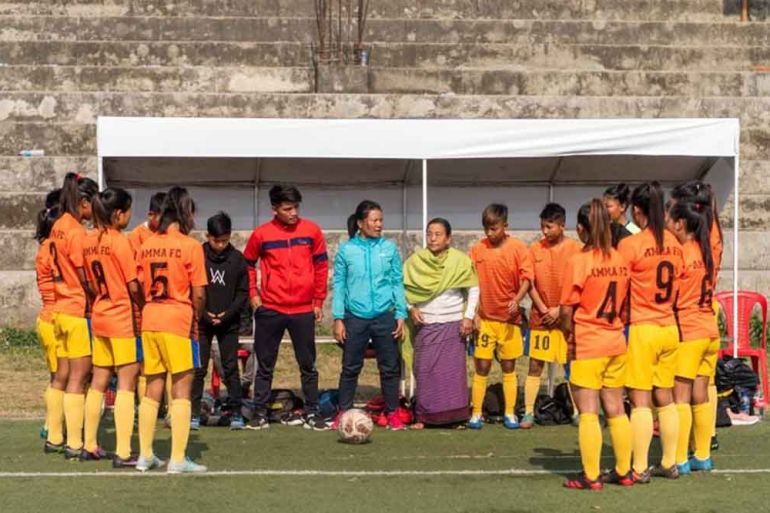
Andro, India – Smart in her neon blue jacket and bright red sneakers, Hemarani slips out of the large thatched-roof mud hut and stands squinting up at the rising sun. The sky is streaked pink over the Nongmaiching Ching hills, and the wide open field before her is still swimming in fog. Cows are grazing in the green pastures, and alongside, a group of girls in their football kit is warming up.
This is Andro, a village 26km (16 miles) southeast of Imphal, the capital of India’s northeastern state of Manipur. The hut Hemarani, 30, has just emerged from is the official clubhouse of Andro’s girls football club – AMMA FC – and she is one of the trainers.
Keep reading
list of 4 itemsMoroccan club ‘wins’ cup tie 3-0 after Algerian hosts confiscate kits
‘You lost the league’: Derby loss spoils Klopp’s perfect Liverpool sendoff
Struggling Everton dent Liverpool title hopes in pivotal Merseyside derby
This practice session in January is the last one for the girls before an official rest period, which lasts until April. Almost all 30 of the club’s players – aged five to 18 – have turned up. Many in the team have been preparing for their school leaving examinations, and this training session offers one last merry diversion from their books.
Quickly, the girls pair up and pick up the pace through rounds of kicks, passes, headers and speed drills. The daily, two-hour practice sessions always end with a game, Hemarani says. “The point is to play everyday.”
She gives some of the girls a few pointers about technique, divides up the teams and then lets the senior players like Chingakham Anjali Devi and Phanjoubam Ameba Devi, both of whom are currently players on Imphal’s U-17 team, take over. Twelve of AMMA FC’s present and former players currently play nationally, five internationally.
The pleasant thump of the ball against boots, calls of “pass,” “open, open” and laughter echo across the field. The younger girls shout out to their favourite players and clap from the sidelines. Hemarani lets the game extend a little over the 90-minute mark and then blows the whistle.
On a normal day, the girls take their time stretching and packing up after the game, chatting about school, movies, boys. But nothing about Manipur is normal these days. Still panting from the game, the girls leave in groups, and Hemarani instructs them to head straight home.
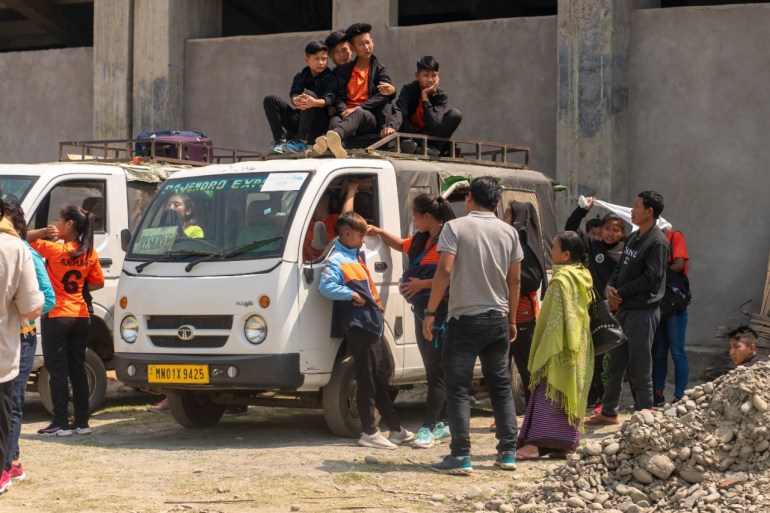
Against a dark background
Just hours before, in a makeshift shack not far from the AMMA FC grounds, a group of women had similarly packed up and headed home. Young and old, they had been sitting awake through the night, warmed by blankets, shawls and a fire, keeping watch over the village. For months now, they have been taking turns guarding the 10,000-strong community in Andro from potential attacks through the night.
Violence broke out in Manipur in May between the majority Hindu Meiteis and the mostly Christian Kuki-Zo people. It was triggered by plans to recognise the Meiteis as a Scheduled Tribe – a type of affirmative action that uses quotas to grant minorities government jobs and college admissions.
The land of the hill tribes of Manipur – the Kukis, Nagas, Mizos – is protected by constitutional provisions. But similar special status for the Meiteis, who make up 60 percent of the state’s population and dominate its politics, could open up the hills too for this majority community, which is currently predominantly in the plains. Violence has raged ever since.
Among the women in the shack, tightly bound in her phanek skirt and shawl, is 65-year-old Laibi Phanjoubam, who talks about how the women pass the time. “We talk about our day, about our plans for the next day, about chores and children,” she says. “But mostly we talk about what is happening in the state, the nearby villages. It lessens our worries a bit.”
Small and shy, Laibi was the first woman from Andro to graduate from college. For the past three decades, she has been running AMMA FC, which was recognised by the All Manipur Football Association in 1999. Her club’s story was recently brought to the screen in filmmaker Meena Longjam’s documentary Andro Dreams.
The hourlong film premiered at the International Film Festival of India. It follows the club’s ups and downs, the grit of its young players, the pressure they face to get married, have children and the experiences of life in a place far removed from India’s bustling urban landscapes, where spirits and shamans still hold sway.
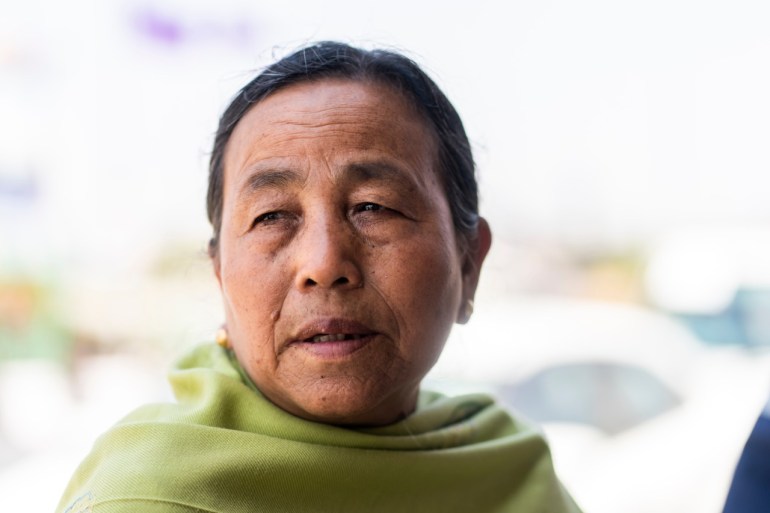
Laibi is the film’s indisputable star. We see her quietly going about her day, farming, cooking, drinking tea, cultivating silkworms and accompanying the players to their matches.
“After finishing my studies, I got involved with various kinds of social work before starting the football club,” she says in the film.
“At one time, friends and family started asking me to get married,” she adds, laughing. “‘But will I have the freedom to go about my life if I were married?’ I asked in return.” She remains steadfastly single.
AMMA FC only trains girls from Andro. “Some girls come on their own. Others are brought by their parents,” Hemarani says. “Training happens daily, even when we are not preparing for matches. Typically, we start at 5:30 in the morning.”
Players trained by AMMA FC (part of the Andro Mahila Morcha Association, or AMMA, the local women’s enterprise that Laibi founded in the 1990s) bring home big and small wins regularly.
In December, goalkeeper Sharubam Anika Devi was invited to attend a training camp in the western coastal state of Goa. In January, she joined India’s U-19 squad in Dhaka, Bangladesh, for the South Asian Football Federation’s U-19 championship.
In late January, Thingbaibam Shakhenbi Devi brought home a gold trophy playing for Manipur’s U-18 women’s football team at the 2023 Khelo India Youth Games in Chennai. This month, former AMMA player Phanjoubam Nirmala Devi is representing the Tamil Nadu-based Sethu FC in the Indian Women’s League.
Other former players, such as Salam Rinaroy Devi and Bina Devi, are also well regarded members of India’s women’s football circuit.
Many of the girls on the team attend the local TAM Mission High School in Andro and the nearby Azad Higher Secondary School in Yairipok. Besides school work and football, they have duties at home – cooking, cleaning, farming. Andro is an agrarian village inhabited by the Lois, a Dalit community on the lower rungs of the Meitei hierarchy.
Traditionally, their primary source of income has been brewing rice beer. Almost all families in the village still make and trade in homemade alcohol. This is what Andro has been known for – until its girls decided to carve out a new identity for the village.
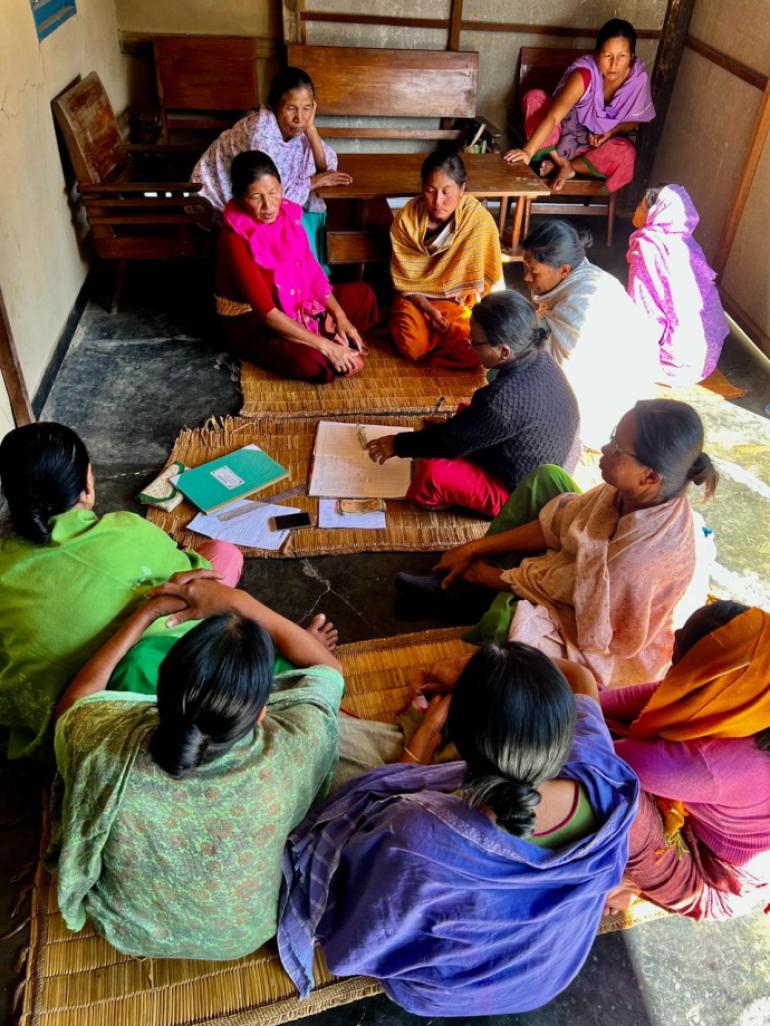
‘All we needed was a ball’
In August, just as Longjam’s film was declared best documentary at the Jagran Film Festival in Mumbai, Manipur was teetering on the brink of civil war.
By September, clashes between the Meiteis and Kukis had killed more than 150 people and displaced nearly 60,000. By January, those numbers had swelled to 200 and 70,000.
Hundreds of houses, places of worship and vehicles have been vandalised. Civil society activists blame Manipur’s Hindu nationalist Bharatiya Janata Party (BJP) government for the violence. They accuse it of deliberately fanning the already tense relationship between the Meiteis and Kukis for political gain. The BJP, which also heads the national government under Prime Minister Narendra Modi, rejects these allegations – even in the face of criticism from some of its own local legislators.
As a multiethnic society, Manipur has seen its share of clashes between communities.
The uncomfortable inclusion of the area in independent India left Manipur steeped in one of the country’s oldest secessionist movements.
One of its outcomes, the Naga-Kuki wars of the 1990s, led to widespread displacement and the loss of hundreds of lives and villages. Armed rebel groups gained strength. Soon their tyranny – marked by illegal taxation, extortion and the drug trade – became a part of the daily lives of Manipuris. As did the ferocity of the government forces’ response.
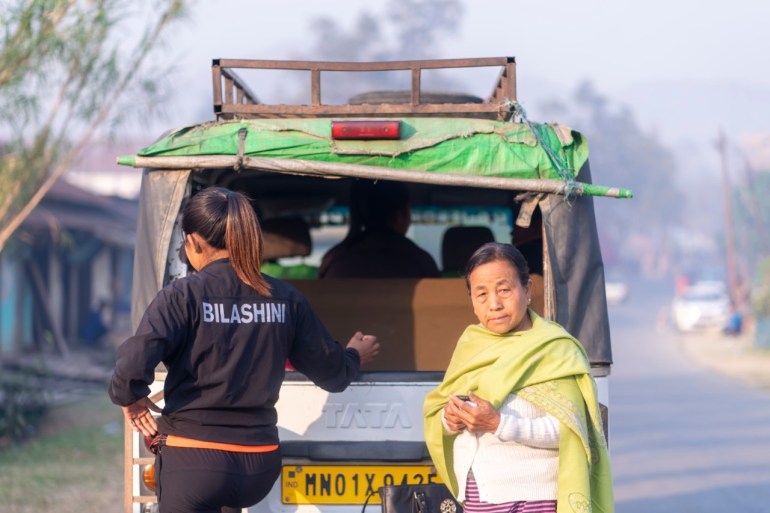
Back in the 1990s, Laibi says, she hoped that football could be a healthy distraction from all of this for the girls of Andro. She never played the game herself but knew bringing youngsters onto the field would not prove tough in this sports-obsessed state.
“There were already many clubs for boys,” she says. “We thought a club for girls would give them confidence.” Starting a football club was economical, she adds. “All we needed was a ball.”
Aside from playing the beautiful game, she meant for the club to also teach the girls discipline and keep them in school, “away from drugs and the armed rebellion”.
The state had already been declared a “disturbed area” a decade before when the Indian government imposed the Armed Forces Special Powers Act (AFSPA). This law grants soldiers immunity for their actions – even if civilians are killed.
In 2000, 28-year-old Manipuri activist Irom Chanu Sharmila began a 16-year-long hunger strike demanding the repeal of the AFSPA.
Then in 2004, 32-year-old Thangjam Manorama was dragged out of her home, raped, tortured and killed, allegedly by soldiers of the Assam Rifles, a paramilitary force responsible for maintaining law and order in the northeast of India. She was suspected of being a “militant”, they said later, but no official complaint had been filed against her. Because of the AFSPA, no soldier was ever charged or prosecuted, and the Assam Rifles have never accepted responsibility.
Manorama’s bullet-riddled body, found 2km (1.2 miles) from a police station, proved a boiling point. A dozen women stripped naked outside the Imphal army camp to protest. They held a banner that read, “Indian Army Rape Us.” Images of their protest shocked the nation and made headlines globally.
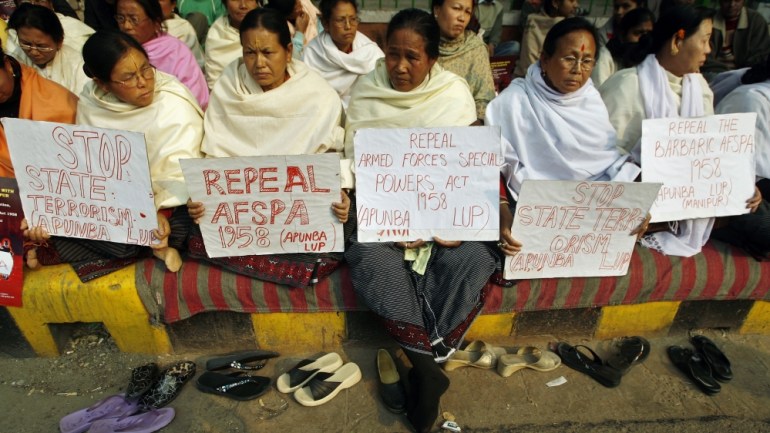
In part, it is the deep-rooted distrust of the state that has compelled women like Laibi to now stand guard over their villages across Manipur every night despite the presence of security forces. But what could a group of unarmed women do if they did have to fend off armed mobs?
“No one is going to attack a group of women in Manipur,” Laibi says. “Here, when a group of women stands in your way, you stop and listen. That is the tradition.”
Despite her assurances, sexual violence has emerged as a recurrent weapon of conflict in this region. In July, a video of two naked Kuki women being groped and paraded by a mob went viral, even with the internet largely blocked due to a statewide shutdown implemented since May.
Outrage over the assault forced Modi to break his silence and make his first public comments about the situation in Manipur, 79 days after the most recent violence broke out.
“The video showing atrocity against women in Manipur is most shameful,” he said. “I’m pained and angered about the incident, and I assure people of the country that the guilty will not be spared and subjected to severest punishment.” But the video was the only aspect of the eight months of violence that Modi has publicly addressed.
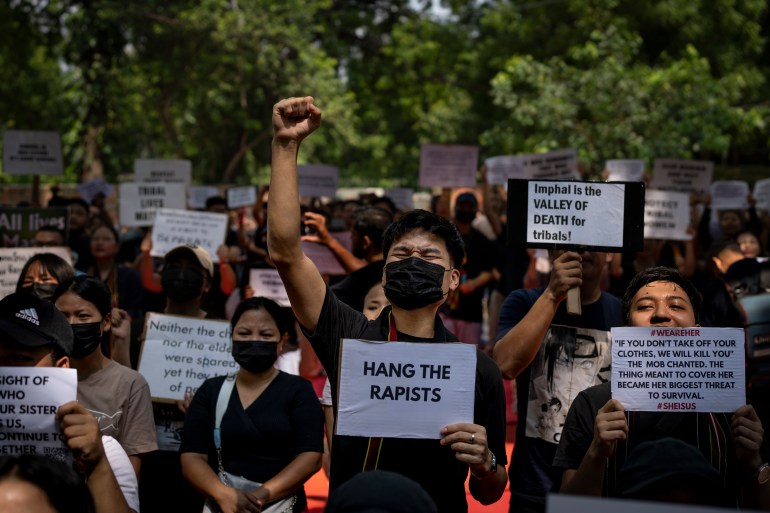
In August, a no-confidence motion was tabled against his government by an alliance of opposition parties. They demanded Modi address the bloodshed in Manipur and remove the state government. In a two-hour speech, Modi dismissed the move as an attempt to “defame India”.
The internet restrictions left Andro cut off and without news of what was happening in the rest of the state. But it also got the AMMA FC players off their phones, much to Laibi’s relief.
Life did not return to normal even after communications were restored in December, though. “There is fear all around, and everyone is constantly vigilant,” Laibi says.
Still, being located in Imphal East away from the hotspots in the west where much of the violence has unfolded, Andro is safer than many other places in Manipur at the moment, she adds.
While anxiety about the situation has kept several players away from the field, training at AMMA FC never stopped. “The rest of the country isn’t going to take a pause because of what is happening in Manipur,” Hemarani says. “Our players still aspire to participate in the national level competitions, and those are still on.”
This year, AMMA FC beat Eastern Sporting Union (ESU), one of the oldest women’s football clubs in Manipur, to win the seven-a-side U-17 Beti Bachao, Beti Padhao tournament, a grassroots football initiative established by the Indian government. AMMA’s Phanjoubam Nirmala Devi was named best player, and Chingakham Geeta Devi was rewarded as best goalkeeper.
The match was decided by a tense penalty shootout, Hemarani says. “ESU always presents a strong front, and we had almost given up when we didn’t score.” It was AMMA’s star players, Chingakham Bimolbala, Phanjoubam Nirmala, Khanumayam Anita and Khanumayam Nirmala, who finally secured the win by not missing a single penalty shot. AMMA won 4-3 in the penalties.
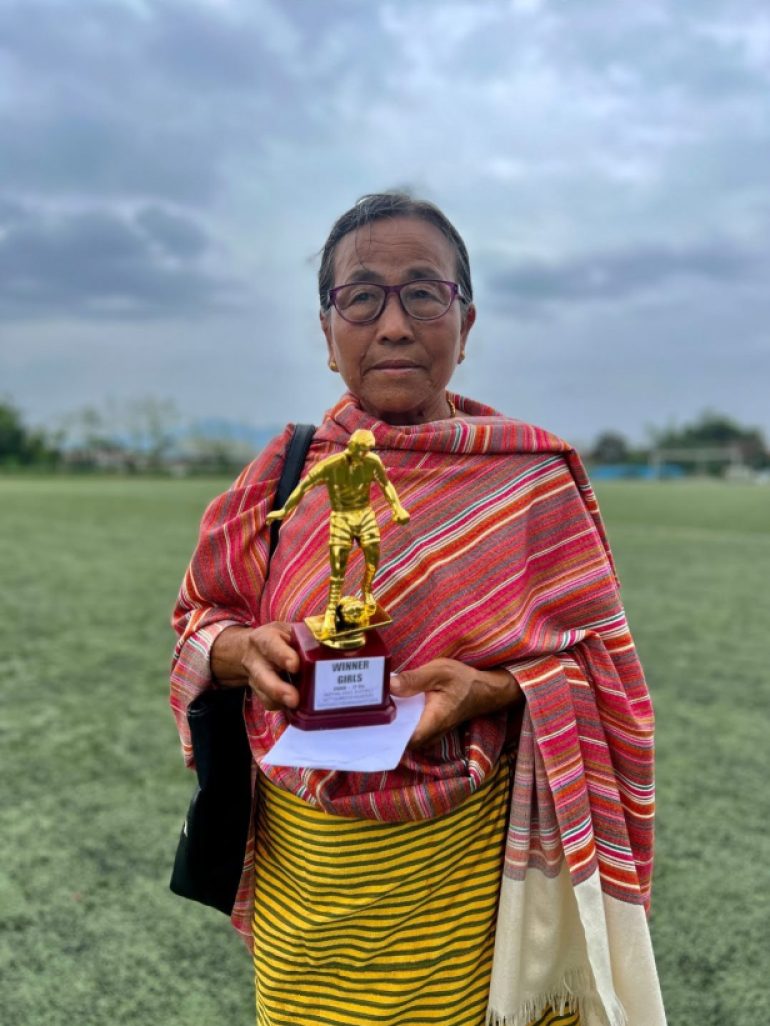
Weaving to support girls football
Usually, the girls stay together at the AMMA FC clubhouse during tournaments. Built on an abandoned graveyard of the Kharam tribe, one of the oldest ethnic tribal groups in Manipur, it is a stone’s throw from Laibi’s house.
None of the players can afford the costs associated with commitment to a sport, so the club provides everything – jerseys, shoes, training equipment. “If we ask them to pay, they will drop out,” Laibi says. Wins like the Beti Bachao championship keep the players’ spirits up, she says, giving them the confidence to appear for competitions and take part in matches against more competitive clubs and players with far better resources.
For a while, AMMA FC received support from Tata Trusts, an Indian social welfare and philanthropic organisation. Now, unlike some other football clubs in Manipur, it does not receive funding from the state or independent donors at all. “AMMA is a hyperlocal enterprise run by village women in their 60s,” Longjam explains. “They are organised and resourceful but not savvy enough to negotiate government grants or sponsors.”
So the club runs on the money the Mahila committee raises from selling handloom woven textiles that members make – scarves, stoles, phaneks, blankets. Laibi sells them from a small shop attached to her house. She also dispatches woven wares to be sold in other parts of Manipur. Occasionally, AMMA organises “chit funds” – a money pooling system – to raise funds for the football club.
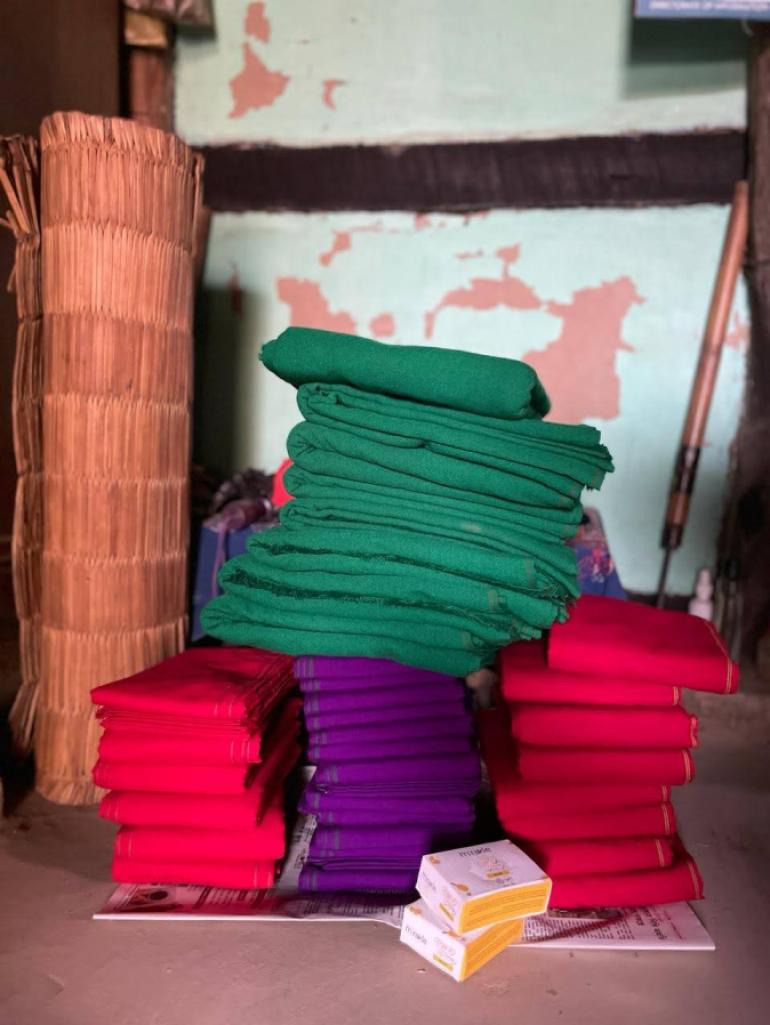
Besides football, AMMA also trains the girls in “soft skills”, including using computers. As a result, Laibi says proudly, several former players have gone on to land government jobs. Among those who have continued to play, some have joined professional football clubs in Karnataka and Tamil Nadu.
Such milestones will, however, become harder to achieve the longer the unrest goes on in Manipur. The violence will restrict the players’ mobility and limit how much they can travel to tournaments. Then there is the very real risk to the players’ personal safety and the effect of the turbulence on their mental wellbeing.
It is in light of this that the All India Football Federation has been delaying the resumption of national-level club football in Manipur, which has long been one of India’s sporting powerhouses.
Last year, 43 athletes from the state represented India at the Asian Games in Hangzhou, China. The Indian women’s football team has always been reliant on the state. Some of the biggest names in women’s football in the country have emerged from Manipur. Even the U-17 team at the recently concluded World Cup had seven players from Manipur while the current national team has four, including captain Ashalata Devi.
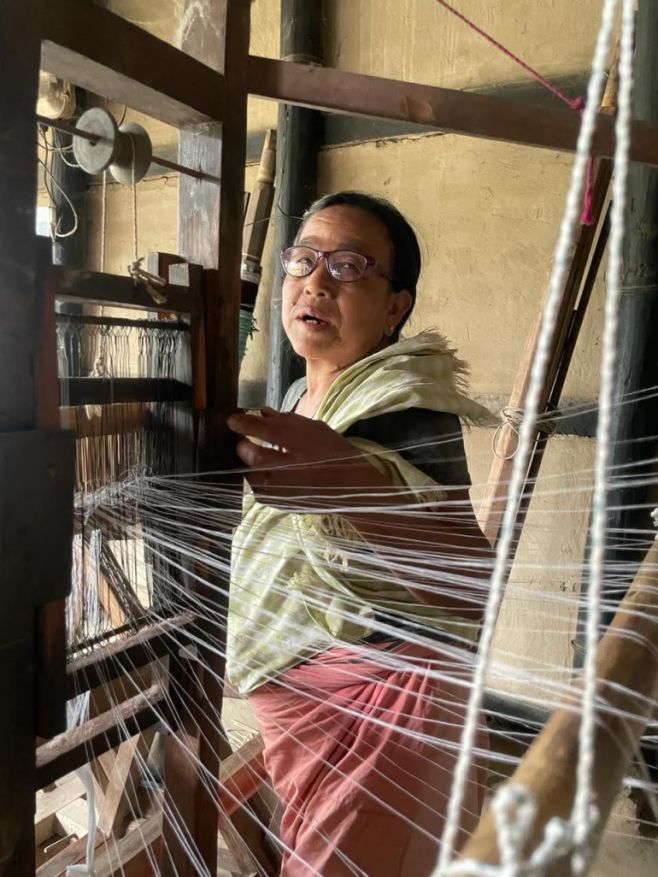
Laibi’s favourite players – the legendary Oinam Bembem Devi, captain of the Indian women’s team for 21 years, and Bala Devi, India’s first female football player to be signed by an international club – also emerged from small clubs in Manipur.
One day, she hopes, AMMA FC’s players will also attain the same level of success. The bio on AMMA FC’s seldom-used Facebook page announces its ambitious plans to “take India to the FIFA World Cup 2027”.
Of all players, however, Laibi draws special inspiration from Lionel Messi. “Messi maintains his peace,” she says. This is her only pointer to the players in her club: “Play peacefully. Be respectful.”